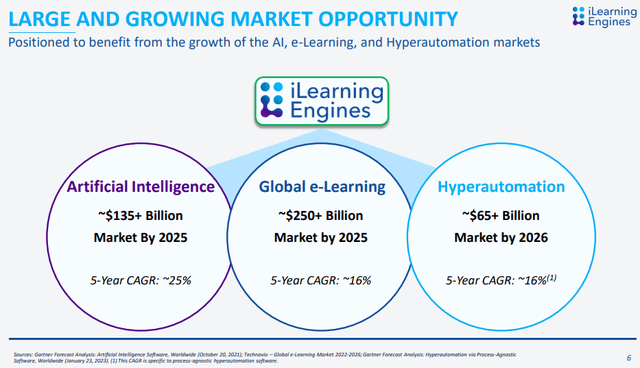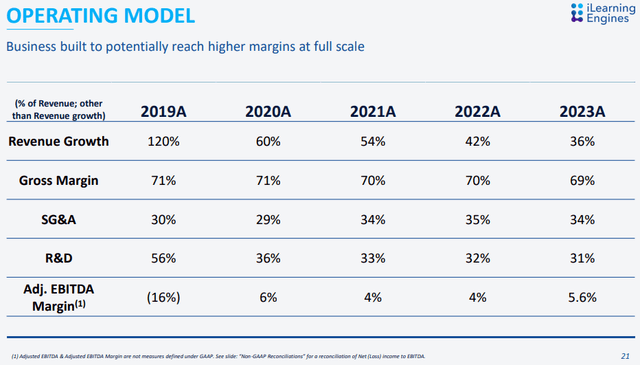A Quick Take on iLearningEngine
The White-Label Emerging AI Giant You Haven't Heard Off
In short
We think that after the shovel-and-picks phase of the AI investment wave, the next wave of investor enthusiasm will be in AI applications that produce organizational improvement.
iLearningEngine (AILE) is a fast-growing, modestly priced undercovered provider of AI-driven solutions like learning automation and information intelligence. It has been flying under the investor radar as it provides white-label solutions and has gone to the Nasdaq only last April.
The company operates in the combination of three large growing markets that are in the early innings of development, AI, Global E-learing, and Hyperautomation.
Investor appreciation will come as the company produces strong (30%+) revenue and ARR growth with 97% of revenue recurring, 70% gross margins with an NRR of 132% in Q1/24.
The platform has 1000+ customers, 4M+ licensed users and a competitive advantage based on proprietary data and algorithms.
The company is profitable (although not yet generating cash) and the shares sell at a modest 2.4x ARR. Wall Street analysts have a $19.5 price target on the shares.
Introduction
iLearningEngine (AILE) is a cutting-edge white-label provider of an AI-driven platform producing education and business process automation. The platform consists of three components:
1) Knowledge Cloud: This acts as a central 'brain,' consolidating an organization's vast internal and external data, from applications like Salesforce and SAP to communication platforms like Slack and Microsoft Teams.
2) Out-of-the-Box AI Engine: This engine utilizes proprietary AI algorithms, including machine learning and natural language processing, to analyze and structure data within the Knowledge Cloud.
3) No-Code Workflow and AI Canvas: This no-code AI-engine that integrates with a host of company applications enables the creation of personalized learning pathways, intelligent chatbots, and automated workflows, all without requiring coding knowledge.
Together, these provide two categories of solutions for organizations:
1) Learning Automation: Creating personalized learning pathways for employees, automating content creation and delivery, and closing knowledge gaps within an organization. This helps companies modernize their training programs and keep employees up-to-date.
2) Information Intelligence: Utilizing AI assistants to streamline workflows, automate processes, and provide real-time insights to improve decision-making. This allows companies to optimize their operations and become more efficient.
There are descriptions on the company website of what the platform can do in the main verticals; healthcare, education, insurance, retail, oil & gas, as well as a host of case studies, as well as the blog. We found the IPO interview especially handy for making things less abstract.
Market
Competitive advantage
Several elements are underpinning the company's competitive position:
Proprietary, sector-specific algorithms and specialized datasets developed through years of research and substantial investment (the company has invested $152M in proprietary datasets to train its vertical-specific AI models).
Strong Customer Stickiness: Deep integration within enterprise systems creates a level of customization that is difficult to replicate.
The company is working on the intersection of three markets, therefore the company doesn't have a like-for-like competitor.
From the IPO interview: “Chidambaran stresses the importance that iLearningEngines continues to pay for data acquisition, as it has done going back to 2018. This way, he says iLearningEngines can ensure that the data used to train and fine-tune their enterprise models and use cases is not only high-quality but also legally obtained... this has inevitably built trust with partners and customers, especially as several AI-driven companies face intellectual property concerns.
Growth Strategy
Expanding platform capabilities
Upselling and cross-selling
New industries
Strategic acquisitions
The company started as iHealth, that is, it was focused on healthcare (due to the personal history of the founder/CEO) and has four main segments
In education, it enables 200K private schools to gain some of the huge after-school tutoring market and in the US it enables schools to capture part of home schooling.
It has now expanded to 12 verticals, leveraging the same infrastructure:
Further expansion is planned, according to the S-1 filing: “we believe there are significant use cases in many other verticals and geographies that can benefit from our solutions. Soon, we intend to focus on a few strategic verticals including cybersecurity, construction, retail, and financial services. We have also identified a number of attractive and underpenetrated geographic markets both in the United States and around the world.”
It’s a platform that enables endless expansion, from the IPO interview: “And you build a use case on it. You then build another use case on it, and then another use case on it, and you already built that infrastructure in place. and that goes right to the retention of the business.. once you build that knowledge cloud with some use cases which is the big sale. You can then upsell the various other use cases, which is the upsell, and the company has a very, very strong net retention, and there is leverage in that sales model right? Historically. And we, we believe how the company is. It's been 50% new bookings and 50% upsells has been the growth trajectory”
Sales cycles (which often go through VARs, value-added resellers) take 6-12 months, the company's solutions are sticky, and switching costs are high, witnessing the NRR of 132% (Q1/24). The company also continues to add VARs:
Finances
Revenue and ARR growth have been well above 30% (33% and 34% in Q1/24) with gross profit growing by 38% and 98% of revenue recurring
Operating leverage is mostly in R&D, which is still pretty high with operating income rising from $2.3M in Q1/23 to $7.9M in Q1/24 and adjusted EBITDA increasing from $2.3M in Q1/23 to $9M in Q1/24, implying a 480bp margin improvement:
Valuation
There are 134.3M shares outstanding, 162.7M fully diluted, delivering a market cap of $1.14B (or $1.38B, fully diluted)
With ARR at $478.9M at the end of Q1, the shares are valued at just 2.4x ARR or 2.1x FY24 sales, these are modest multiples.
After Q1 the company entered into a $60M credit facility, which was partly used to pay off existing facilities ($21.1M). The convertible notes were converted into shares at the IPO.
Conclusion
The company offers a unique platform that’s easy to integrate, producing a host of use cases that are endlessly expandible
There are plenty of growth avenues in front of the company, adding logos, segments, and upselling with an NRR of 132% testifying to the success of the latter.
Its solutions are deeply ingrained into its clients producing high switching costs as it uses proprietary customer data augmented by years of collecting and buying high-quality industry data.
98% of revenues are recurring and the company benefits from high gross margins of around 70%.
There seems to be plenty of operational leverage attainable going forward.
The shares aren't expensive, Wall Street has a $19.5 price target on the shares.
There are some risks:
The AR account is somewhat high and rising although not excessively so (DSO is actually falling so this isn’t an immediate worry). It is the reason the company, while being profitable (once you ignore one-time non-cash costs) but not yet generating cash.
Insiders own 90%+ of the company with the founder and CEO alone owning 70%+. He has stated to be a long-term holder but other insiders might create some overhang, although institutional ownership is still minimal (as the shares IPO was in April), so this could be absorbed by institutional buying.
The upshot: We think that this is a unique, fast-growing company still in the early innings selling at modest valuation multiples when investor attention will shift from AI infrastructure plays towards companies like this that produce AI-driven applications.








